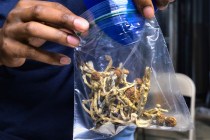Clark County rejects medical pot grow limit
Clark County commissioners are betting on the free market to figure out how much square footage Nevada needs for cultivation facilities that will grow the state’s medical marijuana crop.
Commissioners on Tuesday agreed that a potential state-imposed limit on the square footage allowed for medical marijuana facilities runs contrary to allowing businesses to make their own decisions.
That possibility has raised concerns in the industry about a limit hiking up the cost of medical marijuana for consumers, as well as shutting out or limiting otherwise qualified applicants who want to start grow houses.
Commissioners will send county staff to voice their stance at a Sept. 23 meeting that the state Division of Public and Behavioral Health plans to hold for medical marijuana stakeholders.
At the center of the concern is a state regulation that allows, but doesn’t require, the state agency to limit the cultivation of medical marijuana in Nevada. The state estimates Nevada needs about 650,000 to 1 million square feet of cultivation space to support the needs of Nevada residents and out-of-state visitors with medical marijuana cards.
“Let the free market play out on it,” Commissioner Larry Brown said. “We’re there to make sure the safety of the customer and the safety of the industry is in place.”
The state has received applications from throughout Nevada that seek a total square footage of cultivation space that is roughly two to three times the state’s calculations of what’s necessary.
Commissioners in June approved 58 applicants seeking to operate cultivation facilities in unincorporated areas of the county. All applicants still need state approval before the businesses can open. The county also approved 18 dispensaries, 38 production facilities, and five laboratories that test medical marijuana.
“I know one of the major concerns we all had was that this medicine remained affordable for people,” commission Chairman Steve Sisolak said.
There are concerns that a cultivation limit would affect the amount of medical marijuana available to produce high-concentrate medicine products that aren’t smoked, such as lotions.
There are varied possibilities for state officials beyond imposing a limit. The state could determine a higher square footage is needed, or it could simply grant certificates to all qualified applications. Another option is to limit the amount of medical marijuana produced at all facilities that qualify.
The state has received 520 applications for medical marijuana establishments, 182 of them for cultivation facilities.
Supporters of medical marijuana say the drug helps a variety of conditions such as epilepsy and glaucoma, and relieves chronic pain from cancer, multiple sclerosis and other sources.
The state plans to score and rank the applications through October, and issue certificates in November. State officials anticipate the first dispensaries opening early next year.
Contact Ben Botkin at bbotkin@reviewjournal.com or 702-405-9781. Find him on Twitter: @BenBotkin1.






















